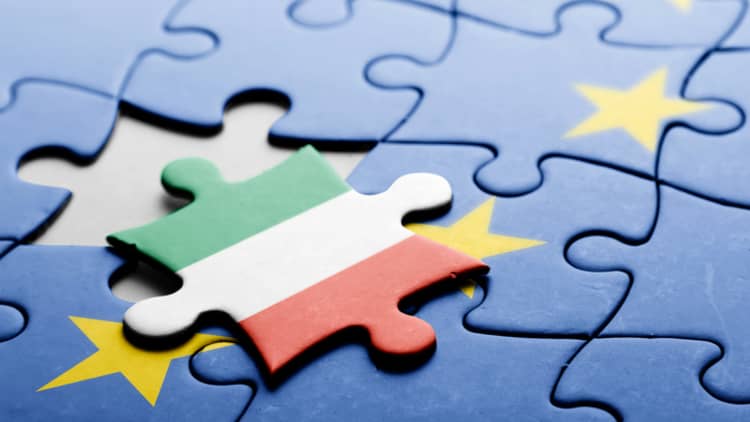
Voters get another chance this weekend to throw markets and banks for a loop.
This time it's in Italy, where citizens are getting ready for a crucial referendum Sunday that may decide the fate of Prime Minister Matteo Renzi and could dramatically overhaul the way the country makes laws. But it's Italy's banks that could suffer the real blow, if voters shut down Renzi and his proposed reforms.
Italian banks are on the knife’s edge.Mark Fleming-WilliamsEurope analyst, Stratfor
Italian banks are hampered by a staggering number of nonperforming loans — meaning loans that are in default, or close to it. The International Monetary Fund said in a July report that Italian banks held approximately $381 billion in nonperforming debt, which marks a tremendous 18 percent of outstanding loans.
Shares of Italian banks UniCredit, Unione di Banche Italiane, Banca Popolare di Milano and Banca Monte dei Paschi have all dived at least 60 percent in 2016, with Monte dei Paschi down around 83 percent year to date.
Italian banks in 2016
Renzi, an ambitious politician who at age 41 is the youngest prime minister in Italian history, wants to change the constitution so that the executive branch needs approval only from parliament's lower house in order to pass laws. Legislation is a slow, arduous process in Italy, where there are a high number of lawmakers relative to the population, and where the two houses of parliament essentially have the same, duplicate powers.
A "yes" vote would make it easier for Renzi to push through reforms to boost the national economy. A "no" vote, on the other hand, means the country's current checks will stay in place and could cost Renzi his job — on Nov. 17, Renzi doubled down on his promise to resign if the referendum failed.
If the referendum fails, it could be a problem for the country's banks, because recapitalizing those financial institutions could be harder, said Federico Santi, an analyst at Eurasia Group.
"The fear is that banks, particularly [Monte dei Paschi], will need public money," he said. Monte dei Paschi is Italy's third-largest lender and had more than $25 billion in bad debt as of 2015. A "no" vote could also drive up Italian interest rates.
Italy's banks probably can't look to the European Union, either. Any bailout from the EU would be a long way off because of regulations the bloc put into place in 2014. Under the new requirements, before a bank is bailed out, it must first go through a "bail in," a mechanism by which a bank on the cusp of failing imposes losses on its creditors and depositors.
Such a bail in would be devastating to a large number of regular Italians. A third of the country's total outstanding debt is held by those retail investors, according to ratings agency Fitch.
"Italian banks are on the knife's edge. It will take a long time" for Italy as a whole to get its debt situation in order, said Mark Fleming-Williams, Europe analyst at Stratfor, who noted that Italy is contending with a 132 percent debt-to-GDP ratio. By comparison, the U.S. debt-to-GDP ratio stands at 104 percent.
Italian bond yields have risen sharply since bottoming out in early September, with the benchmark 10-year note yielding around 2 percent on Thursday.
Italian 10-year yield in 2016
The European Central Bank in 2015 began massive quantitative easing — a program for increasing the money supply by buying up government bonds and driving down interest rates — that amounted by 60 billion euros per month ($63.6 billion). The program was subsequently extended to March 2017, but the ECB has not indicated that it will continue the stimulus program beyond then.
Reuters reported Tuesday, citing sources, that the ECB would temporarily increase Italian bond purchases should Sunday's referendum drive up Italy's borrowing costs.
Italy is the European Union's third largest economy, excluding the United Kingdom, which is on its way out.
Rise of the right
Market watchers around the world are also paying attention to the referendum because it could increase support for right-wing parties such as the Five-Star Movement and the Lega Nord. An increase in their power, combined with the uncertainty surrounding the banks, could make markets more volatile in the short term, Peter Donisanu, global research analyst at Wells Fargo Investment Institute, said in a Nov. 10 note.
"We have to very much start thinking this might be happening," said Mike van Dulken, head of research at Accendo Markets, a trading firm in London, referring to a rise in right-wing movements in Italy and across Europe. He noted that a far-right party could soon be in power in Austria, which holds also elections Sunday.
"This would be significant because it would be the first developed European country to see a populist party in power," he said, while adding that markets may not take a hit in the short term. "On the flip side, look at how well the markets have taken [President-elect Donald] Trump and Brexit."
Following Brexit, equity markets across the globe fell sharply as investors were unprepared for the June plebiscite result, before kicking off a rally. And a sharp overnight sell-off in U.S. stock futures the night of the U.S. election was short-lived, as stocks skyrocketed into record highs.
Polling in Italy currently indicates that "no" voters lead by 3 percentage points.


